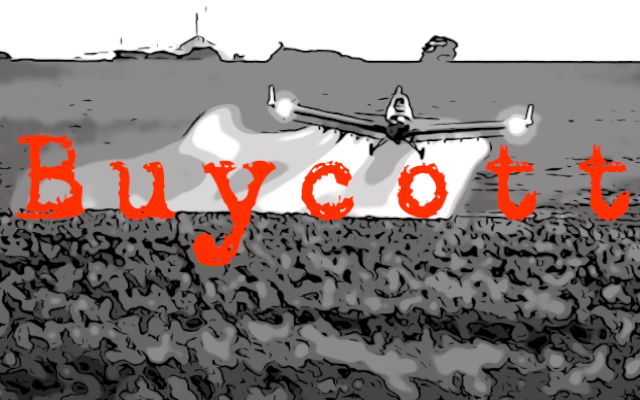#Buycott! A grassroots movement aimed at disrupting demand for GMO soybeans and palm oil, as well as U.S. meats. After the campaign, a petition. Here’s why and how to participate.
GMO soy, palm oil and American meats. The champions of unsustainability
GMO soy and palm oil are the leading causes of international crimes against humanity and ecocides, in the Amazon as in other virgin areas of Latin America, Asia and Africa. (1)
American meats, in turn, are often derived from animals grazing in deforested areas. In the Amazon and Cerrado, as in the Gran Chaco and elsewhere. Further north, in the U.S. as well as in Canada, intensive and extensive animal husbandry resorts to cloning animals, without traceability or consumer information.
Veterinary drugs are used-such as growth hormones and anabolic drugs-that have been banned in Europe for decades. The use of antibiotics is not subject to the strict restrictions established in the EU to mitigate the risks associated with antibiotic resistance. And cattle are also fed animal meal.
#Buycott! A campaign, and a petition
The #Buycott campaign was launched by Égalité together with GIFT (
Great Italian Food Trade
), on 4.8.19. To draw civil society ‘s attention to the social and ecological crises caused by GMO soybean and palm oil supply chains. As well as meats from the American continent.
The #Buycott petition-which we urge everyone to sign, following the link https://www.egalite.org/buycott-petizione/-was launched by Égalité Onlus just in the past few days. Aiming to strengthen consumersAwareness of their power to impart change. Stopping the demand for products derived from bloodthirsty and incendiary supply chains so that the economic interest that fuels them ceases.
#Buycott! The role of consumAtors and supply chain operators.
It is imperative to raise awareness among the general public about the real impact of the supply chains denounced by the #Buycott! campaign on local communities, animal welfare and ecosystems.
Without neglecting attention to the health of consumers, who are inevitably exposed to residues of pesticides and other substances (ab) used without precautions in the aforementioned monocultures. In addition to the risks that can come from eating meat from animals doped with hormones and other drugs not surprisingly banned in Europe for many years.
The goal is to induce livestock operators, industry and distribution in Italy to orient their agrifood supply chains toward theSustainable Development Goals(SDGs) included by the United Nations General Assembly in UN Agenda 2030.
Only through pneumatic pressure from below, from conscious and determined consumAtors, will it be possible to induce operators in Italy to change procurement policies. We need to overcome the logic of ‘convenience at all costs’ to shape procurement policies under the banner of sustainability. (3)
Let’s start with us, replacing products derived from the commodities targeted by Buycott-palm oil, GMO soybeans and U.S. meats-with alternative commodities. That they come from 100% sustainable supply-chains, tracked as such, of which clear and transparent news is offered on the label. Always favoring products that come from short, fair and sustainable supply chains. Even better if it is organic and asseverated by public blockchain systems.
Dario Dongo
Notes
(1) See previous articles on land grabbing and palm oil in Gabon and Congo, to cite a couple of examples, at https://www.greatitalianfoodtrade.it/consum-attori/olio-di-palma-e-deforestazioni-nell-eden-dell-africa-coi-soldi-della-banca-mondiale and https://www.greatitalianfoodtrade.it/idee/congo-olio-di-palma-e-colonialismo
(2) Self-referential certifications of hypothetical sustainability of GMO palm and soybeans, which have already proven to be totally unreliable, should also be shunned. See previous articles https://www.greatitalianfoodtrade.it/consum-attori/olio-di-palma-insostenibile-dalle-favole-dei-palmocrati-ai-dati-su-emissioni-di-gas-serra-e-cambiamento-climatico, https://www.greatitalianfoodtrade.it/consum-attori/olio-di-palma-insostenibili-bugie-e-connivenze-politiche , https://www.greatitalianfoodtrade.it/consum-attori/olio-di-palma-ferrero-sostenibilità, https://www.greatitalianfoodtrade.it/idee/olio-di-palma-rapina-delle-terre-e-deforestazioni-un-milione-di-ettari-sfugge-ai-registri-di-rspo-denuncia-la-zoological-society-of-london
(3) The ISO Guidelines for Sustainable Procurement, ISO 20400:2017, are also cited in this regard. V. https://www.greatitalianfoodtrade.it/progresso/iso-20400-linee-guida-per-l-approvvigionamento-da-filiere-sostenibili
Dario Dongo, lawyer and journalist, PhD in international food law, founder of WIISE (FARE - GIFT - Food Times) and Égalité.




